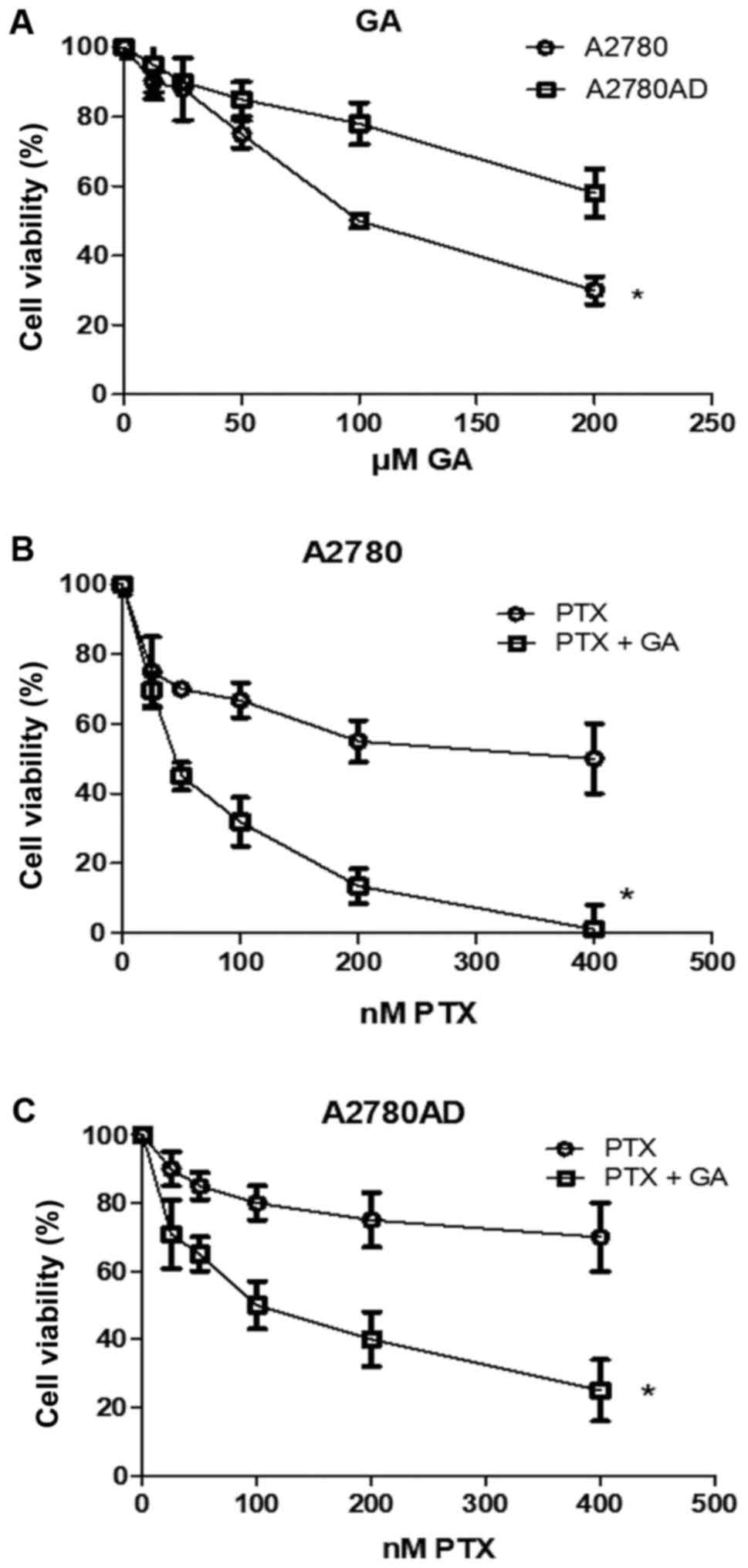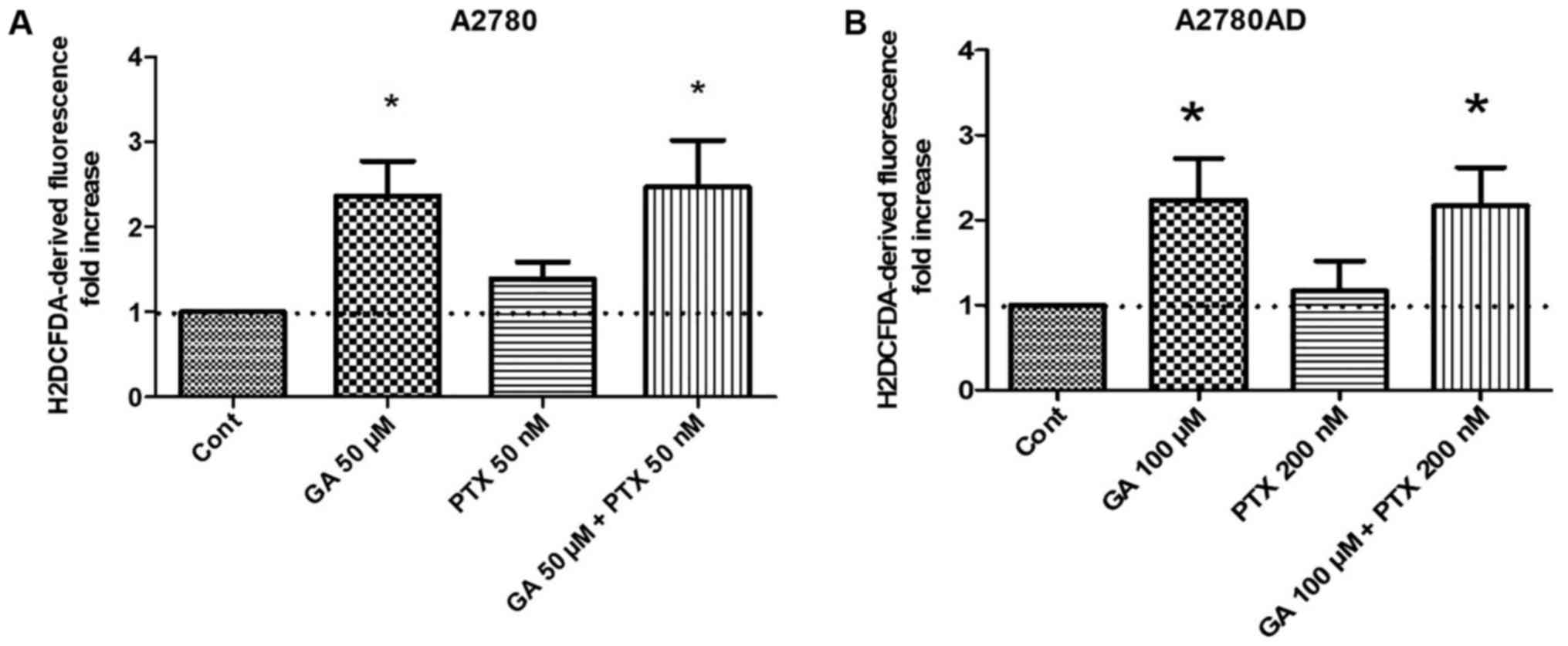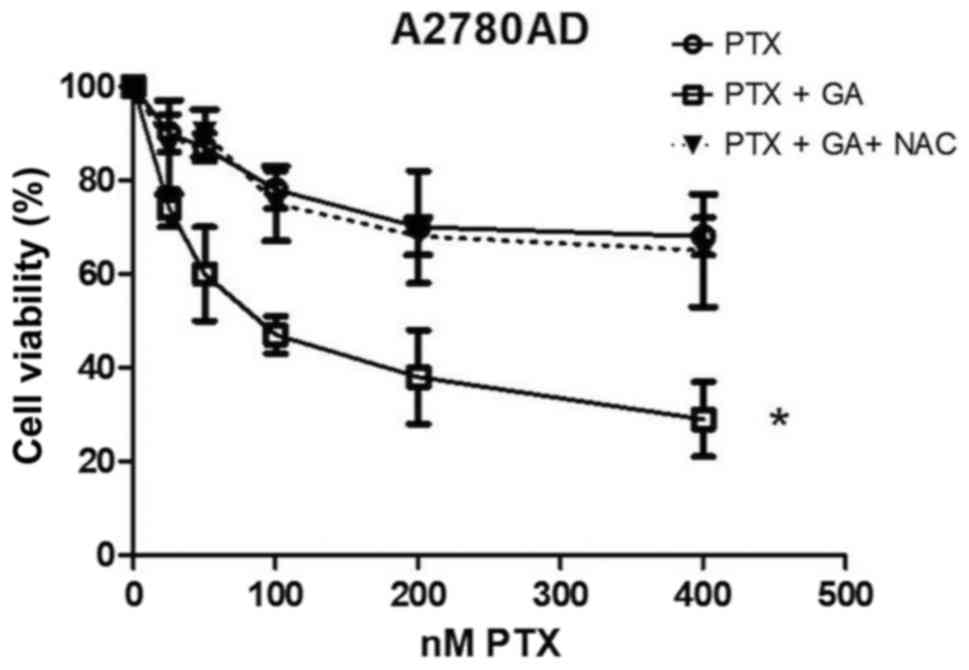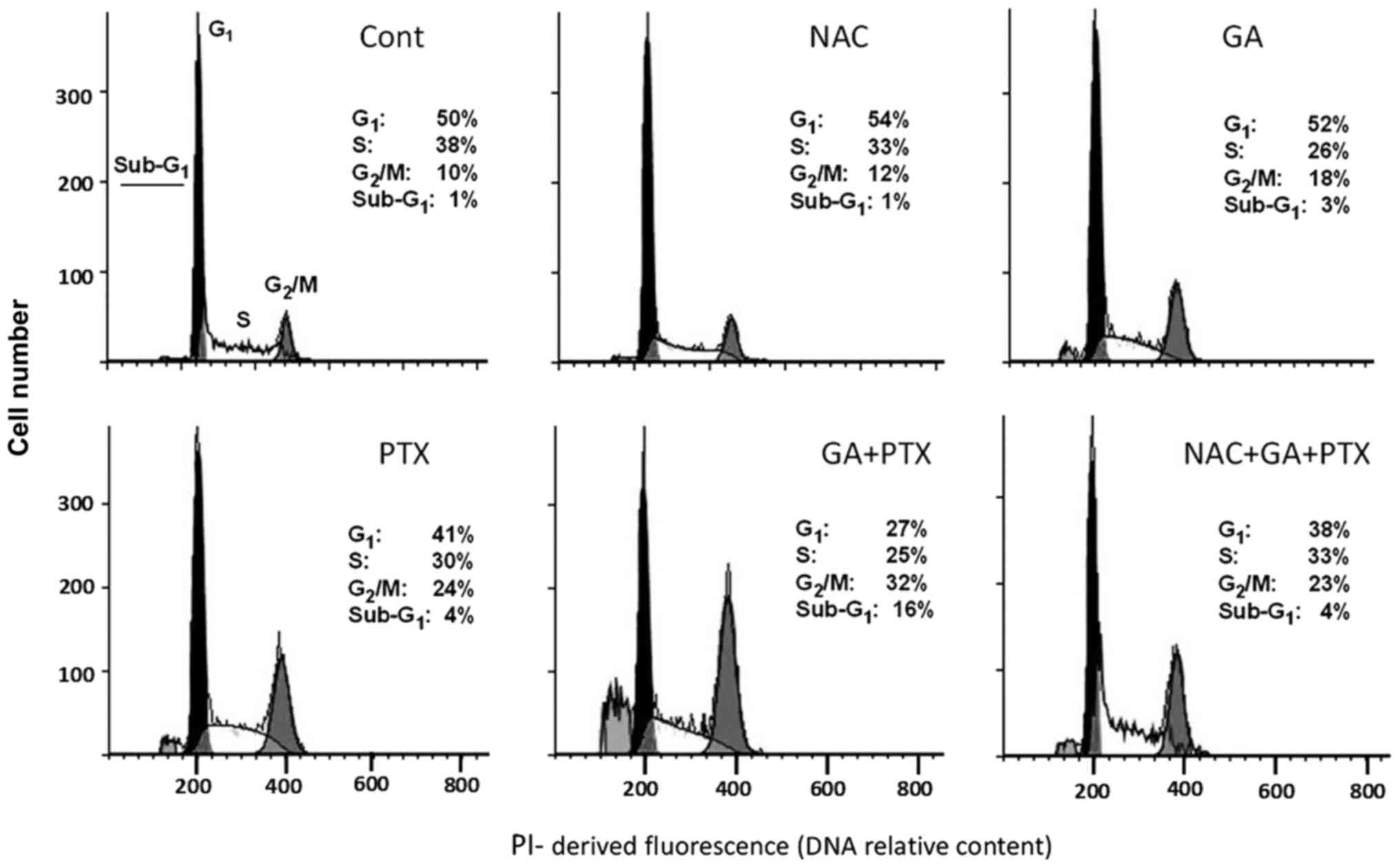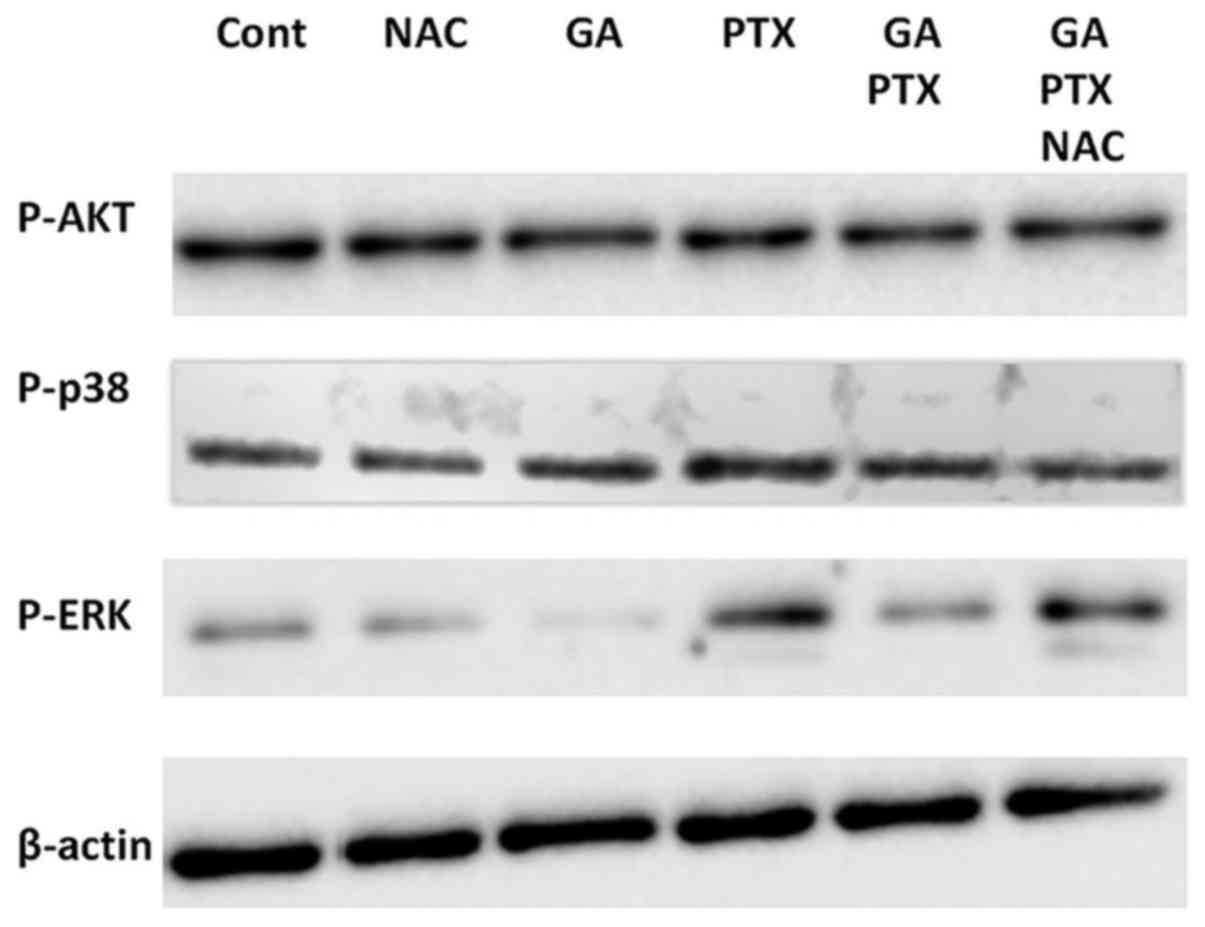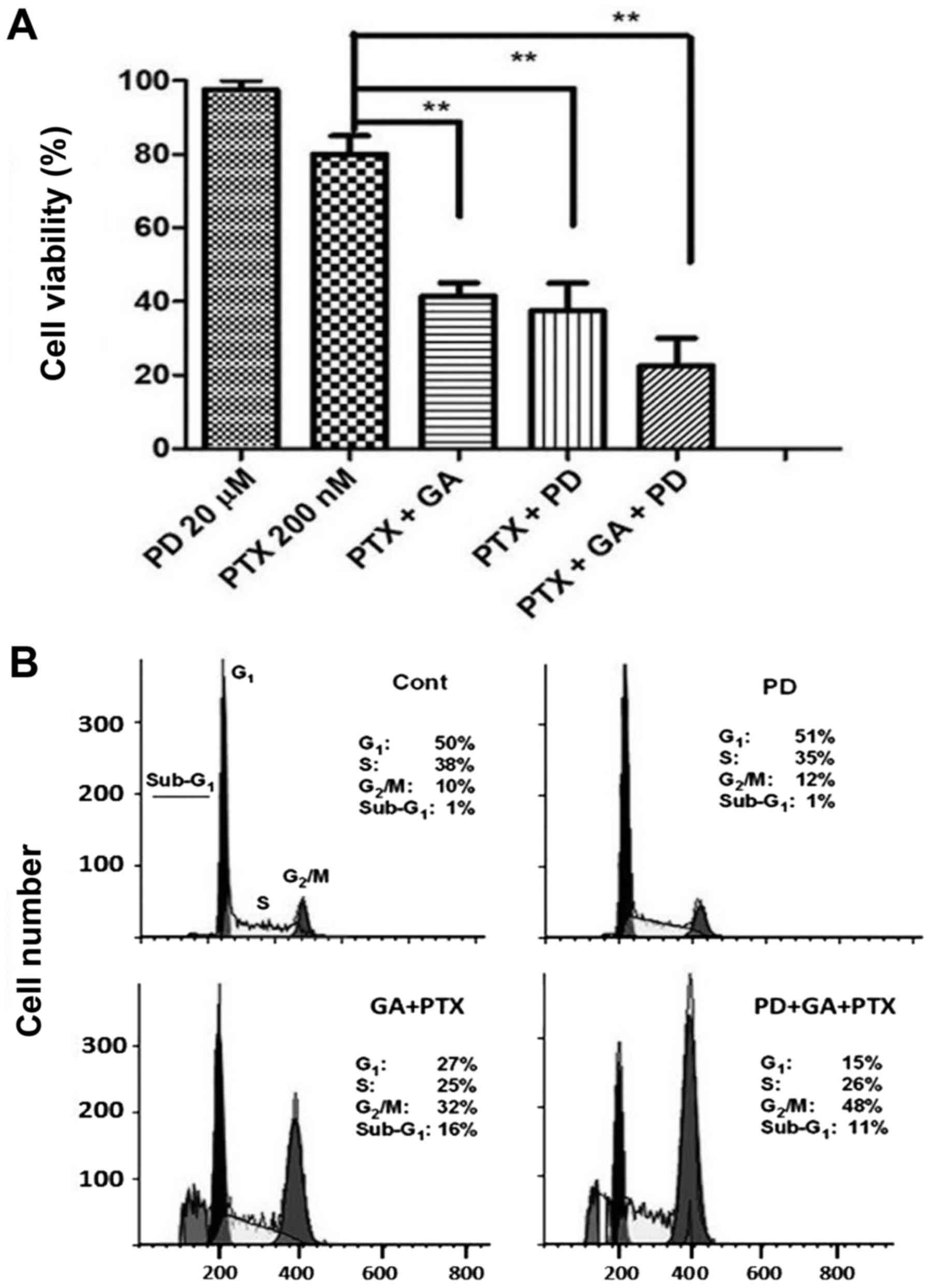|
1
|
Parkin DM, Bray F, Ferlay J and Pisani P:
Global cancer statistics, 2002. CA Cancer J Clin. 55:74–108. 2005.
View Article : Google Scholar : PubMed/NCBI
|
|
2
|
Fuchs DA and Johnson RK: Cytologic
evidence that taxol, an antineoplastic agent from Taxus
brevifolia, acts as a mitotic spindle poison. Cancer Treat Rep.
62:1219–1222. 1978.PubMed/NCBI
|
|
3
|
Jordan MA, Toso RJ, Thrower D and Wilson
L: Mechanism of mitotic block and inhibition of cell proliferation
by taxol at low concentrations. Proc Natl Acad Sci USA.
90:9552–9556. 1993. View Article : Google Scholar : PubMed/NCBI
|
|
4
|
Jordan MA and Wilson L: Microtubules as a
target for anticancer drugs. Nat Rev Cancer. 4:253–265. 2004.
View Article : Google Scholar : PubMed/NCBI
|
|
5
|
Conte PF, Cianci C and Gadducci A: Up date
in the management of advanced ovarian carcinoma. Crit Rev Oncol
Hematol. 32:49–58. 1999. View Article : Google Scholar : PubMed/NCBI
|
|
6
|
Kumar S, Mahdi H, Bryant C, Shah JP, Garg
G and Munkarah A: Clinical trials and progress with paclitaxel in
ovarian cancer. Int J Womens Health. 2:411–427. 2010. View Article : Google Scholar : PubMed/NCBI
|
|
7
|
McGrail DJ, Khambhati NN, Qi MX, Patel KS,
Ravikumar N, Brandenburg CP and Dawson MR: Alterations in ovarian
cancer cell adhesion drive taxol resistance by increasing
microtubule dynamics in a FAK-dependent manner. Sci Rep.
5:95292015. View Article : Google Scholar : PubMed/NCBI
|
|
8
|
Link A, Balaguer F and Goel A: Cancer
chemoprevention by dietary polyphenols: Promising role for
epigenetics. Biochem Pharmacol. 80:1771–1792. 2010. View Article : Google Scholar : PubMed/NCBI
|
|
9
|
Rattanata N, Klaynongsruang S, Daduang S,
Tavichakorntrakool R, Limpaiboon T, Lekphrom R, Boonsiri P and
Daduang J: Inhibitory effects of gallic acid isolated from
Caesalpinia mimosoides Lamk on cholangiocarcinoma cell lines
and foodborne pathogenic bacteria. Asian Pac J Cancer Prev.
17:1341–1345. 2016. View Article : Google Scholar : PubMed/NCBI
|
|
10
|
Inoue M, Suzuki R, Koide T, Sakaguchi N,
Ogihara Y and Yabu Y: Antioxidant, gallic acid, induces apoptosis
in HL-60RG cells. Biochem Biophys Res Commun. 204:898–904. 1994.
View Article : Google Scholar : PubMed/NCBI
|
|
11
|
Sakagami H and Satoh K: Prooxidant action
of two antioxidants: Ascorbic acid and gallic acid. Anticancer Res.
17A:221–224. 1997.
|
|
12
|
Strlic M, Radovic T, Kolar J and Pihlar B:
Anti- and prooxidative properties of gallic acid in fenton-type
systems. J Agric Food Chem. 50:6313–6317. 2002. View Article : Google Scholar : PubMed/NCBI
|
|
13
|
Fleury C, Mignotte B and Vayssière JL:
Mitochondrial reactive oxygen species in cell death signaling.
Biochimie. 84:131–141. 2002. View Article : Google Scholar : PubMed/NCBI
|
|
14
|
Wartenberg M, Hoffmann E, Schwindt H,
Grünheck F, Petros J, Arnold JR, Hescheler J and Sauer H: Reactive
oxygen species-linked regulation of the multidrug resistance
transporter P-glycoprotein in Nox-1 overexpressing prostate tumor
spheroids. FEBS Lett. 579:4541–4549. 2005. View Article : Google Scholar : PubMed/NCBI
|
|
15
|
McCubrey JA, Lahair MM and Franklin RA:
Reactive oxygen species-induced activation of the MAP kinase
signaling pathways. Antioxid Redox Signal. 8:1775–1789. 2006.
View Article : Google Scholar : PubMed/NCBI
|
|
16
|
Xia Z, Dickens M, Raingeaud J, Davis RJ
and Greenberg ME: Opposing effects of ERK and JNK-p38 MAP kinases
on apoptosis. Science. 270:1326–1331. 1995. View Article : Google Scholar : PubMed/NCBI
|
|
17
|
MacKeigan JP, Taxman DJ, Hunter D, Earp HS
III, Graves LM and Ting JP: Inactivation of the antiapoptotic
phosphatidylinositol 3-kinase-Akt pathway by the combined treatment
of taxol and mitogen-activated protein kinase kinase inhibition.
Clin Cancer Res. 8:2091–2099. 2002.PubMed/NCBI
|
|
18
|
Kowalski RJ, Giannakakou P, Gunasekera SP,
Longley RE, Day BW and Hamel E: The microtubule-stabilizing agent
discodermolide competitively inhibits the binding of paclitaxel
(Taxol) to tubulin polymers, enhances tubulin nucleation reactions
more potently than paclitaxel, and inhibits the growth of
paclitaxel-resistant cells. Mol Pharmacol. 52:613–622. 1997.
View Article : Google Scholar : PubMed/NCBI
|
|
19
|
Bakker M, Renes J, Groenhuijzen A, Visser
P, Timmer-Bosscha H, Müller M, Groen HJ, Smit EF and de Vries EG:
Mechanisms for high methoxymorpholino doxorubicin cytotoxicity in
doxorubicin-resistant tumor cell lines. Int J Cancer. 73:362–366.
1997. View Article : Google Scholar : PubMed/NCBI
|
|
20
|
Buey RM, Barasoain I, Jackson E, Meyer A,
Giannakakou P, Paterson I, Mooberry S, Andreu JM and Díaz JF:
Microtubule interactions with chemically diverse stabilizing
agents: Thermodynamics of binding to the paclitaxel site predicts
cytotoxicity. Chem Biol. 12:1269–1279. 2005. View Article : Google Scholar : PubMed/NCBI
|
|
21
|
Eruslanov E and Kusmartsev S:
Identification of ROS using oxidized DCFDA and flow-cytometry.
Methods Mol Biol. 594:57–72. 2010. View Article : Google Scholar : PubMed/NCBI
|
|
22
|
Andreu JM and Barasoain I: The interaction
of Baccatin III with the Taxol binding site of microtubules
determined by a homogeneous assay with fluorescent taxoid.
Biochemistry. 40:11975–11984. 2001. View Article : Google Scholar : PubMed/NCBI
|
|
23
|
Ormerod MG, Collins MKL,
Rodriguez-Tarduchy G and Robertson D: Apoptosis in
interleukin-3-dependent haemopoietic cells. Quantification by two
flow cytometric methods. J Immunol Methods. 153:57–65. 1992.
View Article : Google Scholar : PubMed/NCBI
|
|
24
|
Martindale JL and Holbrook NJ: Cellular
response to oxidative stress: Signaling for suicide and survival. J
Cell Physiol. 192:1–15. 2002. View Article : Google Scholar : PubMed/NCBI
|
|
25
|
Johnson GL and Lapadat R:
Mitogen-activated protein kinase pathways mediated by ERK, JNK, and
p38 protein kinases. Science. 298:1911–1912. 2002. View Article : Google Scholar : PubMed/NCBI
|
|
26
|
Platanias LC: Map kinase signaling
pathways and hematologic malignancies. Blood. 101:4667–4679. 2003.
View Article : Google Scholar : PubMed/NCBI
|
|
27
|
Chang L and Karin M: Mammalian MAP kinase
signalling cascades. Nature. 410:37–40. 2001. View Article : Google Scholar : PubMed/NCBI
|
|
28
|
Johnson NL, Gardner AM, Diener KM,
Lange-Carter CA, Gleavy J, Jarpe MB, Minden A, Karin M, Zon LI and
Johnson GL: Signal transduction pathways regulated by
mitogen-activated/extracellular response kinase kinase kinase
induce cell death. J Biol Chem. 271:3229–3237. 1996. View Article : Google Scholar : PubMed/NCBI
|
|
29
|
Wada T and Penninger JM: Mitogen-activated
protein kinases in apoptosis regulation. Oncogene. 23:2838–2849.
2004. View Article : Google Scholar : PubMed/NCBI
|
|
30
|
Sarkar D, Su Z-Z, Lebedeva IV, Sauane M,
Gopalkrishnan RV, Valerie K, Dent P and Fisher PB: mda-7 (IL-24)
Mediates selective apoptosis in human melanoma cells by inducing
the coordinated overexpression of the GADD family of genes by means
of p38 MAPK. Proc Natl Acad Sci USA. 99:10054–10059. 2002.
View Article : Google Scholar : PubMed/NCBI
|
|
31
|
Sarwar T, Zafaryab M, Husain MA, Ishqi HM,
Rehman SU, Rizvi MM and Tabish M: Redox cycling of endogenous
copper by ferulic acid leads to cellular DNA breakage and
consequent cell death: A putative cancer chemotherapy mechanism.
Toxicol Appl Pharmacol. 289:251–261. 2015. View Article : Google Scholar : PubMed/NCBI
|
|
32
|
Karthikeyan S, Kanimozhi G, Prasad NR and
Mahalakshmi R: Radiosensitizing effect of ferulic acid on human
cervical carcinoma cells in vitro. Toxicol In Vitro. 25:1366–1375.
2011. View Article : Google Scholar : PubMed/NCBI
|
|
33
|
Delman DM, Fabian CJ, Kimler BF, Yeh H and
Petroff BK: Effects of flaxseed lignan secoisolariciresinol
diglucosideon preneoplastic biomarkers of cancer progression in a
model of simultaneous breast and ovarian cancer development. Nutr
Cancer. 67:857–864. 2015. View Article : Google Scholar : PubMed/NCBI
|
|
34
|
Kaur M, Velmurugan B, Rajamanickam S,
Agarwal R and Agarwal C: Gallic acid, an active constituent of
grape seed extract, exhibits anti-proliferative, pro-apoptotic and
anti-tumorigenic effects against prostate carcinoma xenograft
growth in nude mice. Pharm Res. 26:2133–2140. 2009. View Article : Google Scholar : PubMed/NCBI
|
|
35
|
Sánchez-Carranza JN, Alvarez L,
Marquina-Bahena S, Salas-Vidal E, Cuevas V, Jiménez EW, Veloz G RA,
Carraz M and González-Maya L: Phenolic compounds isolated from
Caesalpinia coriaria induce S and G2/M phase cell cycle
arrest differentially and trigger cell death by interfering with
microtubule dynamics in cancer cell lines. Molecules. 22:6662017.
View Article : Google Scholar
|
|
36
|
Baran CP, Zeigler MM, Tridandapani S and
Marsh CB: The role of ROS and RNS in regulating life and death of
blood monocytes. Curr Pharm Des. 10:855–866. 2004. View Article : Google Scholar : PubMed/NCBI
|
|
37
|
Wallach-Dayan SB, Izbicki G, Cohen PY,
Gerstl-Golan R, Fine A and Breuer R: Bleomycin initiates apoptosis
of lung epithelial cells by ROS but not by Fas/FasL pathway. Am J
Physiol Lung Cell Mol Physiol. 290:L790–L796. 2006. View Article : Google Scholar : PubMed/NCBI
|
|
38
|
Ji BC, Hsu WH, Yang JS, Hsia TC, Lu CC,
Chiang JH, Yang JL, Lin CH, Lin JJ, Suen LJ, et al: Gallic acid
induces apoptosis via caspase-3 and mitochondrion-dependent
pathways in vitro and suppresses lung xenograft tumor growth in
vivo. J Agric Food Chem. 57:7596–7604. 2009. View Article : Google Scholar : PubMed/NCBI
|
|
39
|
Park WH and Kim SH: MAPK inhibitors
augment gallic acid-induced A549 lung cancer cell death through the
enhancement of glutathione depletion. Oncol Rep. 30:513–519. 2013.
View Article : Google Scholar : PubMed/NCBI
|
|
40
|
Park WH: The effect of MAPK inhibitors and
ROS modulators on cell growth and death of
H2O2-treated HeLa cells. Mol Med Rep.
8:557–564. 2013. View Article : Google Scholar : PubMed/NCBI
|
|
41
|
You BR and Park WH: The enhancement of
propyl gallate-induced HeLa cell death by MAPK inhibitors is
accompanied by increasing ROS levels. Mol Biol Rep. 38:2349–2358.
2011. View Article : Google Scholar : PubMed/NCBI
|
|
42
|
Liang CZ, Zhang X, Li H, Tao YQ, Tao LJ,
Yang ZR, Zhou XP, Shi ZL and Tao HM: Gallic acid induces the
apoptosis of human osteosarcoma cells in vitro and in vivo via the
regulation of mitogen-activated protein kinase pathways. Cancer
Biother Radiopharm. 27:701–710. 2012. View Article : Google Scholar : PubMed/NCBI
|
|
43
|
Greenberg VL and Zimmer SG: Paclitaxel
induces the phosphorylation of the eukaryotic translation
initiation factor 4E-binding protein 1 through a Cdk1-dependent
mechanism. Oncogene. 24:4851–4860. 2005. View Article : Google Scholar : PubMed/NCBI
|
|
44
|
MacKeigan JP, Collins TS and Ting JP-Y:
MEK inhibition enhances paclitaxel-induced tumor apoptosis. J Biol
Chem. 275:38953–38956. 2000. View Article : Google Scholar : PubMed/NCBI
|
|
45
|
Henson ES and Gibson SB: Surviving cell
death through epidermal growth factor (EGF) signal transduction
pathways: Implications for cancer therapy. Cell Signal.
18:2089–2097. 2006. View Article : Google Scholar : PubMed/NCBI
|
|
46
|
Lee YJ, Kang IJ, Bünger R and Kang YH:
Enhanced survival effect of pyruvate correlates MAPK and NF-kappaB
activation in hydrogen peroxide-treated human endothelial cells. J
Appl Physiol 1985. 96:793–801; discussion 792. 2004. View Article : Google Scholar : PubMed/NCBI
|
|
47
|
McDaid HM and Horwitz SB: Selective
potentiation of paclitaxel (taxol)-induced cell death by
mitogen-activated protein kinase kinase inhibition in human cancer
cell lines. Mol Pharmacol. 60:290–301. 2001. View Article : Google Scholar : PubMed/NCBI
|
|
48
|
Zelivianski S, Spellman M, Kellerman M,
Kakitelashvilli V, Zhou X-W, Lugo E, Lee M-S, Taylor R, Davis TL,
Hauke R, et al: ERK inhibitor PD98059 enhances docetaxel-induced
apoptosis of androgen-independent human prostate cancer cells. Int
J Cancer. 107:478–485. 2003. View Article : Google Scholar : PubMed/NCBI
|
|
49
|
Yu C, Wang S, Dent P and Grant S:
Sequence-dependent potentiation of paclitaxel-mediated apoptosis in
human leukemia cells by inhibitors of the mitogen-activated protein
kinase kinase/mitogen-activated protein kinase pathway. Mol
Pharmacol. 60:143–154. 2001. View Article : Google Scholar : PubMed/NCBI
|















